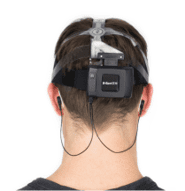Eurofins The NFL sustainable food case studies
Eurofins’ The National Food Lab (The NFL) in the US offers a range of food services which can address sustainability concerns, from product design, consumer insights and sensory science, product and process development and agile innovation.
The NFL food and beverage consumer product development services are extensive, offering existing and novel strategies for sustainable food development. Examples of sustainable food projects undertaken are shown in the following case studies.
Case study | Plant-based burger acceptance using real-time metrics
Our client wanted to determine the liking of their plant-based food compared to 3 competitors using real-time metrics.
The Challenge
An Electroencephalogram (EEG) can record electrical wave patterns in the brain. The acquired data can be translated into validated mental metrics pertaining to the cognitive and emotional states. When paired with sensory techniques, such as Temporal Dominance of Sensation (TDS), EEG can be used to highlight how brain activity (liking or avoidance wave patterns) in the prefrontal cortex can correlate to sensory perceptions of texture.
The NFL’s solution
 15 of The NFL’s trained panellists evaluated 4 plant-based samples using TDS. While panellists completed their evaluation, neurophysiological data was collected through the use of an EEG, measuring brain electrical activity.
15 of The NFL’s trained panellists evaluated 4 plant-based samples using TDS. While panellists completed their evaluation, neurophysiological data was collected through the use of an EEG, measuring brain electrical activity.
EEG data was converted from individual frequency bands into a mental state index labelled ‘Frontal Alpha Asymmetry’. This asymmetry reflected an approach/avoidance relationship. Positive values represented an approach or ‘liking’ response, while negative values indicated an avoidance or ‘disliking’ response. The mean value of all subjects’ frontal asymmetry alpha power across time, by sample, was calculated. Statistical analysis, t-test (FDR corrected), was completed on the mean frontal asymmetry alpha power to determine the times that the samples were significantly different (p<0.05).
TDS data was evaluated by indicating the mean dominant attributes over time. Pearson’s correlation was completed to determine the relationship between each dominant attribute and the Frontal Asymmetry index.
The outcome
The NFL was able to determine which sample was most liked, based on the combination of sensory and EEG data.
This sample had the highest approach or ‘liking’ response during the entirety of the sensory experience.
The NFL gave the client actionable insights on texture, cohesiveness and juiciness to guide future product improvements.
Case study | Food upcycling
A global food and beverage company approached The NFL about using waste materials to create tasty bar snacks. After consulting with the client on flavour and texture profile targets and potential inclusions, Eurofins NFL developed multiple prototypes over two iterative rounds. The NFL then established the formulas and prep procedures for the winning prototypes. The NFL’s pilot plant produced samples for use in consumer insights testing of the product.
Case study | Protein functionality
A global food and beverage company asked NFL to screen dozens of plant protein ingredients for function and potential use in various food and beverage systems. Eurofins NFL developed and executed methods to evaluate these proteins in model systems for their solubility, heat stability, water-holding capacity and emulsion properties. Eurofins’ The NFL also developed recommended pH range for use in the processing of these proteins.
Case study | Plant-based meat and seafood
A startup in the alternate meat space asked NFL to formulate analogues to traditional meat using plant-based ingredients and to have a similar taste, bite and texture to the original product. Eurofins NFL investigated processing systems that would best deliver the analogue, developed flavour and colour systems to deliver the new product, and performed two rounds of prototyping (3 candidates per SKU/round) to deliver 2 SKUs and associated Nutritionals, along with texture assessment against the original.




